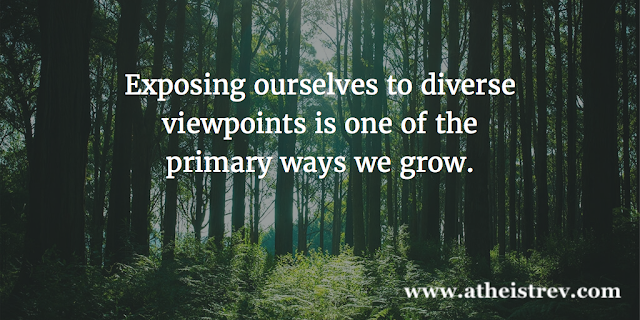When I encounter someone who disagrees with me, all sorts of cool things happen. I recognize that while the other person might be wrong, I might be wrong as well. That's important because it leads me to critically examine my own position as well as the position being advocated by the other person. And when I do turn out to be wrong, it leads me to revise my position. Thus, encountering someone who disagrees with me often leads me to improve my understanding of relevant issues. When I'm wrong, I change my mind. When I'm not wrong, I have almost always learned something and end up with an improved understanding of the subject. I think it is fair to say that the experience of engaging with different viewpoints is one of the primary ways we grow.
Now let's change my mindset a bit and see what happens. Suppose I had managed to convince myself that anyone who disagreed with me was necessarily a racist, a misogynist, or something equally detestable. Were I to encounter a person who disagreed with me while having such a mindset, I would not consider the possibility that I was wrong. I wouldn't need to, and it would make little sense to do so. After all, this was a racist, misogynist, or whatever else. The disagreeing person would obviously be wrong, and I'd be comfortable making that determination a priori. I'd be unlikely to listen to anything such a person said, and I'd probably feel justified in demonizing such a person. There would be little hope of me considering my position and even less hope of me changing my mind. I might even leave the interaction with less of an understanding of the subject, as my outrage would likely interfere with my ability (or at least my willingness) to reason.
In such an situation, I would be similar to the Christian who begins by assuming that their preferred version of their "holy" book is the inerrant word of some sort of god and subsequently distorts everything to fit that "truth" without first determining whether it was true. I'd use a similar sort of circular reasoning. I might insist that someone was wrong because they were a racist, misogynist, etc. and that I knew they were all these things because of the way in which they were wrong. I'd be unwilling to question some of the assumptions I was making. After all, anyone who dared to questions them would themselves be racists, misogynists, etc.
I think there are many ways that outrage - especially when it is chronic or misplaced - can limit our potential to grow. Choosing the comfort and safety of familiar ideas has an obvious appeal, but we pay a price for doing so too often. I find it preferable to expose myself to diverse viewpoints, including those with which I am inclined to disagree or even find objectionable. When I am able to do so without giving into outrage, I find that it is almost always beneficial.
